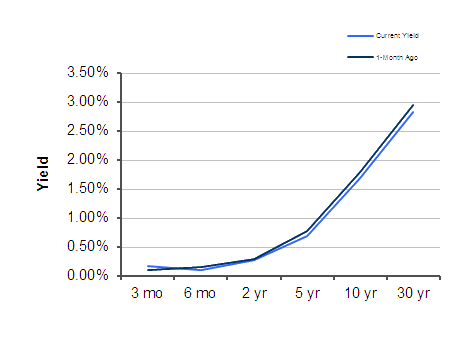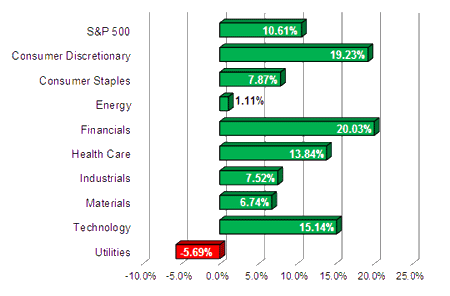
Market Commentary by Scott J. Brown, Ph.D., Chief Economist
 The fiscal cliff refers to a substantial tightening of fiscal policy in 2013. Monetary policy cannot offset the cliff’s negative effect on the economy. However, it would be surprising if a deal were not reached, if not by the end of this year, then in early 2013. Due to concerns about the long-term budget picture, some of the cliff is almost certain to get through.
The fiscal cliff refers to a substantial tightening of fiscal policy in 2013. Monetary policy cannot offset the cliff’s negative effect on the economy. However, it would be surprising if a deal were not reached, if not by the end of this year, then in early 2013. Due to concerns about the long-term budget picture, some of the cliff is almost certain to get through.
Alright, we’ve been over this and over this, and I’m going to keep going over this until I stop getting questions. Okay? There are two issues with the fiscal cliff. One is that the federal budget is on an unsustainable trajectory. No one disputes that or argues that we shouldn’t address it. There’s broad (not universal) agreement that everything should be on the table, tax increases, the possible elimination of deductions, entitlement reforms, and cuts to defense and other types of spending. That’s not what the fiscal cliff is about. The fiscal cliff refers to doing too much too soon to reduce the deficit and the negative impact that would have on the economy.
There’s a lot of pressure on lawmakers to reach a deal and they should have a compromise to avert most of the fiscal cliff. However, it’s unclear whether that will happen this year. The economy could withstand hitting the cliff, provided the White House and the new Congress move quickly to reach a deal in the new year. However, the uncertainty is already believed to have been a factor dampening business fixed investment. Hopefully, negotiations on the fiscal cliff will not collide with efforts to raise the debt ceiling, which is a completely separate issue.Let’s assume that about a quarter of the fiscal cliff will go into effect next year and that the rest will be kicked down the road. That may shave about a full percentage point from GDP growth in 2013. The Fed cannot offset that impact.
The October FOMC minutes and Bernanke’s recent comments suggest that Fed policy will remain very accommodative in 2013. Recall that in its Large-Scale Asset Purchase program (QE3), the Fed is buying about $40 billion in Mortgage-Backed Securities per month (financed by money creation). In its Maturity Extension Program (“Operation Twist”), the Fed is buying $45 billion in long-term Treasury securities (financed by selling a similar amount of short-term Treasuries out of its portfolio). Operation Twist ends next month. There is wide speculation that the Fed will add Treasury purchases to QE3 in January.
To read the full report, visit raymondjames.com.
Indices
| Last | Last Week | YTD return % | |
| DJIA | 12836.89 | 12542.38 | 5.07% |
| NASDAQ | 2926.55 | 2836.94 | 12.34% |
| S&P 500 | 1391.03 | 1353.33 | 10.61% |
| MSCI EAFE | 1507.01 | 1479.42 | 6.69% |
| Russell 2000 | 798.38 | 769.48 | 7.76% |
Consumer Money Rates
| Last | 1-year ago | |
| Prime Rate | 3.25 | 3.25 |
| Fed Funds | 0.17 | 0.08 |
| 30-year mortgage | 3.45 | 4.02 |
Currencies
| Last | 1-year ago | |
| Dollars per British Pound | 1.594 | 1.565 |
| Dollars per Euro | 1.283 | 1.351 |
| Japanese Yen per Dollar | 82.460 | 76.950 |
| Canadian Dollars per Dollar | 0.997 | 1.039 |
| Mexican Peso per Dollar | 13.034 | 14.007 |
Commodities
| Last | 1-year ago | |
| Crude Oil | 86.93 | 96.69 |
| Gold | 1729.90 | 1673.95 |
Bond Rates
| Last | 1-month ago | |
| 2-year treasury | 0.27 | 0.30 |
| 10-year treasury | 1.69 | 1.79 |
| 10-year municipal (TEY) | 2.71 | 3.00 |
Treasury Yield Curve – 11/23/2012
S&P Sector Performance (YTD) – 11/23/2012
Economic Calendar
| November 27th |
— |
Durable Goods Orders (October) Consumer Confidence (November) |
| November 28th |
— |
New Home Sales (October) Fed Beige Book |
| November 29th |
— |
Real GDP (3Q12, 2nd estimate) |
| November 30th |
— |
Personal Income, Spending (October) |
| December 7th |
— |
Employment Report (November) |
| December 12th |
— |
FOMC Policy Decision, Bernanke Press Briefing |
Important Disclosures
US government bonds and treasury bills are guaranteed by the US government and, if held to maturity, offer a fixed rate of return and guaranteed principal value. US government bonds are issued and guaranteed as to the timely payment of principal and interest by the federal government. Treasury bills are certificates reflecting short-term (less than one year) obligations of the US government.
Commodities trading is generally considered speculative because of the significant potential for investment loss. Markets for commodities are likely to be volatile and there may be sharp price fluctuations even during periods when prices overall are rising. Specific sector investing can be subject to different and greater risks than more diversified investments.
Tax Equiv Muni yields (TEY) assume a 35% tax rate on triple-A rated, tax-exempt insured revenue bonds.
![]() Material prepared by Raymond James for use by its financial advisors.
Material prepared by Raymond James for use by its financial advisors.
The information contained herein has been obtained from sources considered reliable, but we do not guarantee that the foregoing material is accurate or complete. Data source: Bloomberg, as of close of business November 22nd, 2012.
©2012 Raymond James Financial Services, Inc. member FINRA / SIPC.




